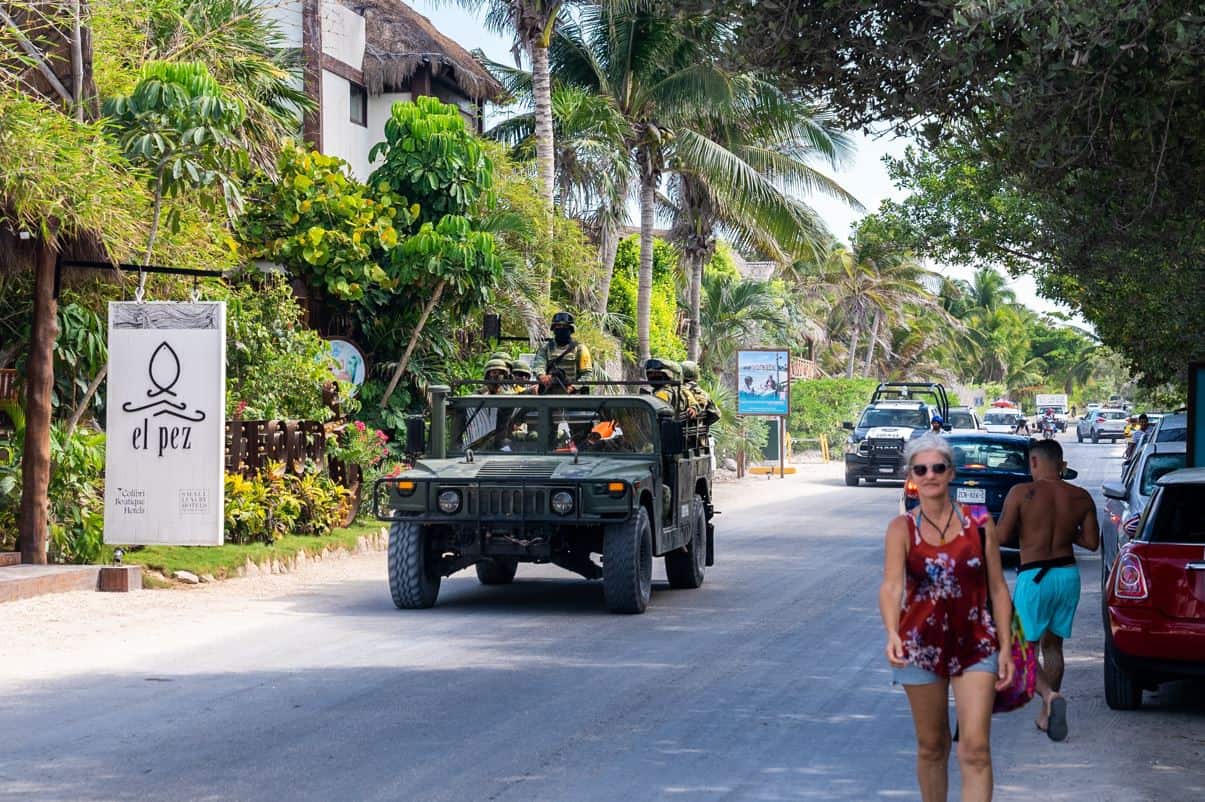Tulum, one of the travelers’ favorite destinations in the Mexican Caribbean, is currently under inspection. Visitors might encounter armed guards from the country’s National Guard at tourist locations like the beach, the Archeological Zone, and in town. 50 troops have been deployed by the government to guarantee safety throughout popular tourist hotspots.
According to the information shared by The Cancun Sun, seeing armed officers might surprise international travelers, but it is common practice in Cancun and the Quintana Roo region in general, so visitors should not fear if they encounter troops.
The government has explained that the measure has been taken to guarantee safety for locals and tourists and that the main mission is to preserve order. Information about how long this mission will take has not been provided and remains indefinite at the moment.
Here’s what travelers should know about the National Guard in Tulum:

Why Are There National Guards In Tulum?
Travelers visiting Tulum in the following days might see officers from the Mexican National Guard patrolling on the beaches —walking or riding ATVs— and in other popular tourist areas.
It’s been reported that the government wants to guarantee a safe environment and that the order comes from the President of Mexico. Gabriel Bautista Tapia, the colonel inspector in personal charge of the National Guard in the Tulum National Park, said that they are watching that certain activities — like illegal alcohol sales, drug dealing, and sales from unauthorized street vendors — are not carried out.

Tulum’s reputation has been recently affected by the rise in crime, loud parties, scams, and large crowds. The government seems to be preparing for a busy spring break season, as many international visitors are expected at this destination.
More About Safety In Tulum
This beautiful destination’s popularity has been attracting travelers from all over the world. Tulum is featured as the perfect destination to soak up the sun, party, and enjoy great activities like swimming in cenotes and visiting the Tulum Archeological Zone. However, due to the increasing number of tourists staying in this coastal city, certain concerns regarding safety have been raised.

In 2022, multiple negative and worrying headlines related to drugs and violence appeared on many international news outlets. From gang-related events to murders, the situation has been delicate. However, despite the troubling news, this destination remains popular among American travelers, and they keep flocking to this town.
Just a few months ago, new noise control laws were implemented in Tulum. Many locals and visitors complained about loud parties that lasted all night. Tulum City Council put into place new rules in November—making people maintain noise levels below 65 decibels— to preserve peace in the area.

Local authorities and hotels have been trying to change Tulum’s reputation as a party destination and are trying to protect families, honeymooners, and tourists’ relaxing experiences.
Tourists Should Remain Vigilant
Although the recent incorporation of the troops of the National Guard of Mexico in tourist areas is a preventive measure, Tulum is a destination where tourists should take precautions.

The U.S. Department of State currently has a level 2 warning, “Exercise Increased Caution”, for the Quintana Roo region—which includes Cancun and Tulum. The document states that violent events and criminal activities might occur in popular tourist destinations.
A few weeks ago, The U.S. government also issued a security alert for the region on January 23 due to violent events related to the use of Uber. Taxis in Tulum are extremely expensive, and there is also a tense —and even violent— environment between taxi drivers and uber drivers even after Uber won the legal battle to operate in the region.

Travelers visiting Tulum must be careful and exercise increased caution in crowded places or public environments. It is also advised to stay in well-known areas, avoid walking alone at night, and only carry essential items when exploring new destinations.


